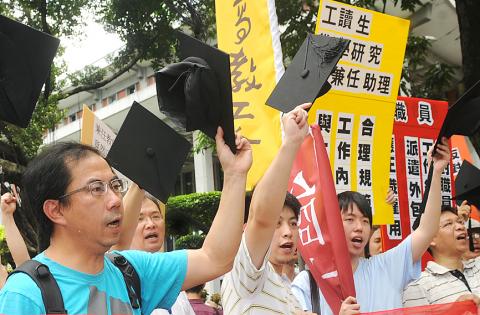Part-time university lecturers on Monday urged the Ministry of Education to address a widening wage gap between themselves and their full-time colleagues.
Members of the Taiwan Higher Education Union said many part-time college instructors, whose numbers have increased by 63 percent over the past decade, earn the minimum monthly wage of about NT$18,900, despite sometimes having to shoulder workloads equal to those of their full-time peers.
The union members summarized seven other types of atypical employment commonly seen on university campuses, including interns, research assistants and contract administrative workers, and demanded reasonable treatment for them.

Photo: Liao Chen-huei, Taipei Times
These non-standard employees are exploited by universities, the members said.
As the number of full-time -faculty positions have been reduced, universities tend to hire several part-time instructors, particularly new doctoral graduates, to share the work of one full-time instructor, the union members said.
Part-time lecturers are not eligible for the same lecturing and research resources because they cannot apply for research projects independently, and they also miss out on pensions and insurance, they said.
Moreover, female part-time -instructors are not allowed to take maternity leave, which is tantamount to a ban on them becoming pregnant, they said.
Representatives of the National Taiwan University union also said the scholarship system has been twisted, with universities treating scholarship and grant recipients as part-time workers. Some low--income students who receive grants are expected to work for as much as 50 hours a semester on campus, they said.

The manufacture of the remaining 28 M1A2T Abrams tanks Taiwan purchased from the US has recently been completed, and they are expected to be delivered within the next one to two months, a source said yesterday. The Ministry of National Defense is arranging cargo ships to transport the tanks to Taiwan as soon as possible, said the source, who is familiar with the matter. The estimated arrival time ranges from late this month to early next month, the source said. The 28 Abrams tanks make up the third and final batch of a total of 108 tanks, valued at about NT$40.5 billion

Two Taiwanese prosecutors were questioned by Chinese security personnel at their hotel during a trip to China’s Henan Province this month, the Mainland Affairs Council (MAC) said yesterday. The officers had personal information on the prosecutors, including “when they were assigned to their posts, their work locations and job titles,” MAC Deputy Minister and spokesman Liang Wen-chieh (梁文傑) said. On top of asking about their agencies and positions, the officers also questioned the prosecutors about the Cross-Strait Joint Crime-Fighting and Judicial Mutual Assistance Agreement, a pact that serves as the framework for Taiwan-China cooperation on combating crime and providing judicial assistance, Liang

A group from the Taiwanese Designers in Australia association yesterday represented Taiwan at the Midsumma Pride March in Melbourne. The march, held in the St. Kilda suburb, is the city’s largest LGBTQIA+ parade and the flagship event of the annual Midsumma Festival. It attracted more than 45,000 spectators who supported the 400 groups and 10,000 marchers that participated this year, the association said. Taiwanese Designers said they organized a team to march for Taiwan this year, joining politicians, government agencies, professionals and community organizations in showing support for LGBTQIA+ people and diverse communities. As the first country in Asia to legalize same-sex

MOTIVES QUESTIONED The PLA considers Xi’s policies toward Taiwan to be driven by personal considerations rather than military assessment, the Epoch Times reports Chinese President Xi Jinping’s (習近平) latest purge of the Chinese People’s Liberation Army (PLA) leadership might have been prompted by the military’s opposition to plans of invading Taiwan, the Epoch Times said. The Chinese military opposes waging war against Taiwan by a large consensus, putting it at odds with Xi’s vision, the Falun Gong-affiliated daily said in a report on Thursday, citing anonymous sources with insight into the PLA’s inner workings. The opposition is not the opinion of a few generals, but a widely shared view among the PLA cadre, the Epoch Times cited them as saying. “Chinese forces know full well that